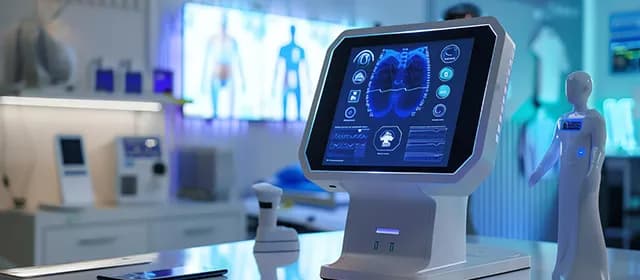Do you want hassle-free lab testing services? Don’t worry, direct-to-consumer (DTC) lab testing refers to a service that allows you to order and access laboratory tests without the need for a healthcare provider's involvement or a traditional doctor's prescription. It involves direct interaction between the consumer and the laboratory, bypassing the traditional healthcare system. Let’s see how this direct-to-consumer lab testing works.
Steps to Get Direct-to-Consumer Lab Testing for Yourself
With direct-to-consumer lab testing, you can request and pay for specific tests or test panels directly from a laboratory or an online platform. These tests can range from basic wellness screenings to more specialized tests for typical health conditions. The process of direct-to-consumer lab testing usually involves the following steps:
Step 1: Selection and ordering
Consumers choose the specific tests they want to have performed from a menu of available options. This can be done through an online platform or by contacting the laboratory directly.
Step 2: Payment
Consumers typically pay for the selected tests upfront, either through an online payment system or by providing their payment details over the phone.
Step 3: Sample Collection
Once the tests are ordered and paid for, you need to collect the necessary samples, which can vary depending on the type of test. Sample collection may involve blood, urine, saliva, or other bodily fluids, and instructions are usually provided by the laboratory.
Step 4: Shipping
After sample collection, individuals package and ship the samples to the designated laboratory using the provided instructions and materials. Some DTC lab testing services may also offer sample collection kits that can be self-administered at home.
Step 5: Analysis and Results
The laboratory receives the samples and performs the requested tests. Once the analysis is complete, the results are typically made available to the consumer through a secure online portal or delivered via email or mail.
With these effortless steps, you can order one DTC lab test. But remember that DTC lab testing does not provide a diagnosis or treatment plan. The results are intended to provide you with information about their health status and help them make informed decisions regarding their well-being. However, it is recommended that you consult with a healthcare provider to interpret the results and discuss any potential implications or necessary follow-up actions.
The Importance of Direct-to-Consumer (DTC) Lab Testing
DTC lab testing offers convenience and accessibility to individuals who want to proactively monitor their health or gain insights into specific health concerns. However, it is essential to approach these tests with caution and ensure that the selected tests are appropriate and reliable.
- Accessibility and Convenience
DTC lab testing provides you with the convenience of ordering and accessing laboratory tests without the need for a doctor's appointment or a healthcare provider's involvement. This accessibility allows people to take a proactive role in managing their health and well-being.
- Empowerment and Patient Autonomy
DTC lab testing empowers you to take control of their health by providing them with direct access to their health information. It enables them to make informed decisions about their lifestyle, health monitoring, and potential early interventions based on the test results.
- Early Detection and Prevention
DTC lab testing can contribute to the early detection of certain health conditions or risk factors. By identifying potential issues at an early stage, you can take proactive steps to mitigate risks, seek appropriate medical advice, and make necessary lifestyle changes to prevent the development or progression of certain diseases.
- Personalized Health Management
DTC lab testing allows you to customize their health monitoring based on their specific needs and interests. It enables them to select and focus on the tests that are most relevant to their health goals or concerns. This personalized approach can lead to more targeted and effective management of your health.
- Easy Billing
Since these lab test charges are paid directly to the laboratory, you do not have to approach healthcare providers or third-party administrators to handle the billing. However, various online methods are available, which makes billing easy and effortless.
- Health Awareness and Education
DTC lab testing can help raise awareness about various health conditions and promote health education. With the help of direct-to-consumer lab testing, consumers can have direct access to clinical laboratory testing, information, and test results, you can gain a better understanding of their health and become more knowledgeable about specific diseases, risk factors, and preventive measures.
- Research and Public Health Insights
Aggregate and anonymized data collected from DTC lab testing services can contribute to medical research and public health initiatives. Large-scale data analysis can help identify population health trends, understand disease prevalence, and guide public health policies and interventions.
Despite these potential benefits, it is important to consider certain limitations and precautions associated with DTC lab testing. These include the need for proper test selection, test reliability, result interpretation, and the importance of seeking professional medical advice for proper diagnosis and treatment decisions. Let’s quickly understand the challenges of direct-to-consumer lab testing.
Conclusion
In this blog, you have understood that DTC lab testing offers convenience and accessibility to individuals who want to proactively monitor their health or gain insights into specific health concerns. Due to this trend, DTC lab testing companies like VG Acquisitions Corp. and LabCorp have developed tests direct to consumers.
However, it's essential to approach these tests with caution and ensure that the selected tests are appropriate and reliable. So, note that consulting with a healthcare professional is still recommended to ensure proper understanding and interpretation of the results within the context of your overall health.


.webp&w=3840&q=75&dpl=dpl_CDzhLSzynMzoYDwtxx4cZQXJd7NE)

